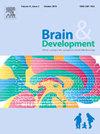巨头畸形和严重智力障碍与鸟嘌呤核苷酸交换因子-1结构域错义变异相关的非典型病例
IF 1.3
4区 医学
Q4 CLINICAL NEUROLOGY
引用次数: 0
摘要
背景:rho鸟嘌呤核苷酸交换因子(TRIO)编码一种鸟嘌呤核苷酸交换因子(GEF),对神经发育至关重要,并调节rho鸟嘌呤三磷酸酶。研究表明,GEF1或GEF2结构域的错义变异或TRIO中的功能缺失变异与小头畸形有关,而spectrin重复结构域的功能获得变异导致大头畸形。已经报道了与GEF1结构域错义变异相关的罕见大头畸形病例;然而,临床细节仍然有限。我们描述了一个日本男孩的情况下,巨大的头畸形,严重的智力障碍,独特的面部特征,脊柱侧凸,生长激素缺乏。脑磁共振显示胼胝体薄,垂体发育不全。他的枕额围大于正常范围+2.5个标准差,而他的身高和体重低于平均水平。他表现出由功能获得变异引起的与trio相关的神经发育障碍的许多特征。然而,基于TRIO的外显子组测序在TRIO的GEF1结构域中发现了一个全新的错义变体(而不是功能获得变体)(NM_007118.4:c.4104T> a, p.(Asp1368Glu))。结论:该病例扩展了trio相关神经发育障碍的表型谱,突出了与GEF1结构域错义变异相关的大头畸形。需要进一步的研究来阐明TRIO变异的功能影响及其表型后果。本文章由计算机程序翻译,如有差异,请以英文原文为准。
An atypical case of macrocephaly and severe intellectual disability associated with a missense variant in the guanine nucleotide exchange factor-1 domain of TRIO
Background
Trio rho guanine nucleotide exchange factor (TRIO), encodes a guanine nucleotide exchange factor (GEF) that is critical for neurodevelopment and regulates Rho guanosine triphosphatase. It has been shown that missense variants in the GEF1 or GEF2 domains or loss-of-function variants in TRIO are associated with microcephaly while gain-of-function variants in the spectrin repeat domain result in macrocephaly. Rare cases of macrocephaly linked to missense variants in the GEF1 domain have been reported; however, clinical details remain limited.
Case presentation
We describe the case of a Japanese boy with macrocephaly, severe intellectual disability, distinctive facial features, scoliosis, and growth hormone deficiency. Brain magnetic resonance imaging revealed a thin corpus callosum and pituitary hypoplasia. His occipitofrontal circumference was +2.5 standard deviations above the normal range, while his height and weight were below the average. He displayed many features characteristic of TRIO-related neurodevelopmental disorders caused by gain-of-function variants. However, trio-based exome sequencing identified a de novo missense variant (instead of gain-of-function variant) in the GEF1 domain of TRIO (NM_007118.4:c.4104T>A, p.(Asp1368Glu)).
Conclusions
This case expands the phenotypic spectrum of TRIO-related neurodevelopmental disorders, highlighting macrocephaly associated with a missense variant in the GEF1 domain. Further studies are required to clarify the functional effects of TRIO variants and their phenotypic consequences.
求助全文
通过发布文献求助,成功后即可免费获取论文全文。
去求助
来源期刊

Brain & Development
医学-临床神经学
CiteScore
3.60
自引率
0.00%
发文量
153
审稿时长
50 days
期刊介绍:
Brain and Development (ISSN 0387-7604) is the Official Journal of the Japanese Society of Child Neurology, and is aimed to promote clinical child neurology and developmental neuroscience.
The journal is devoted to publishing Review Articles, Full Length Original Papers, Case Reports and Letters to the Editor in the field of Child Neurology and related sciences. Proceedings of meetings, and professional announcements will be published at the Editor''s discretion. Letters concerning articles published in Brain and Development and other relevant issues are also welcome.
 求助内容:
求助内容: 应助结果提醒方式:
应助结果提醒方式:


